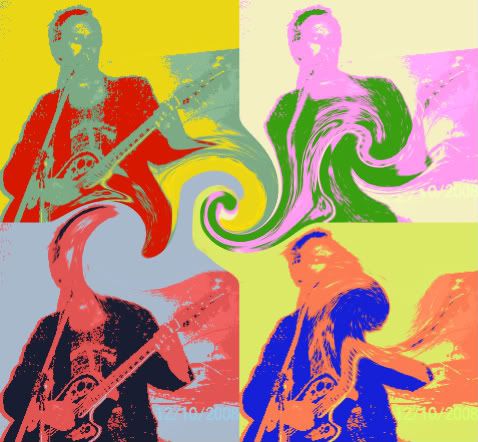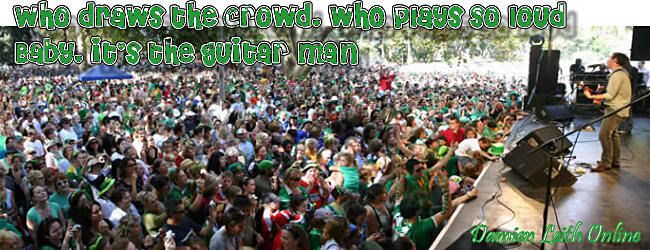A (not quite) short (enough) lesson in Copyright
Dec 7, 2006 21:40:49 GMT 10
Post by dededom on Dec 7, 2006 21:40:49 GMT 10
A question has been raised in one of the threads today as to whether Damien would make any money out of for eg his NOML or other song being played at the Australian Swimming Championship, so I thought I would post some info on copyright for your reading pleasure (some may appreciate the irony in me posting this given the nature of a large portion of the posts I have made over the last month)
Largely, the question depends on whether he wrote the music and/or lyrics or only performed it, and his contract (eg he may have assigned all or some of the rights he has to Sony).
Essentially copyright is the exclusive right granted by law to a person who creates a literary, dramatic, musical and artistic works, and includes the exclusive right to:
- Reproduce the work: This includes recording the music or lyrics onto a CD, a film soundtrack, or onto a computer disk. It also includes reproducing the music or lyrics as sheet music.
- Publish the work: This means making your work available to the public for the first time.
- Perform the work in public: This includes playing the work live at a venue, playing a recording of the work in a venue, business or work place, and showing a film containing the work.
- Communicate the work to the public: This includes communicating the work over the Internet, via a music on hold system or by television or radio broadcasting.
- Make an adaptation of the work: This includes arranging or transcribing music, or translating lyrics.
- Rent a recording of the music: This is the right to control the rental of recordings (on CD for example) of the work.
In the music industry, these rights are usually grouped in the following way:
- The mechanical right: This is the right to record a work on record, cassette or CD. This is usually administered by either the Australasian Mechanical Copyright Owners Society (AMCOS) or by music publishers.
- The synchronisation right: This is the right to use music on the soundtrack of a film or video and is usually administered in the same way as the mechanical right.
- The performing right: This is the right to perform a work in public or to communicate a work to the public. It is administered by APRA (Australian Performing Rights Assn).
There is a separate copyright in the sound recording of a musical work (with or without lyrics). The person or company that owns the rights in the recording owns the right to copy it, record it, perform it, communicate it to the public or rent it out.
Moral rights belong to the creator of a work regardless of whether he or she owns copyright in the work. Briefly the rights are the right to be attributed or credited correctly on the work and the right to object to the derogatory treatment of the work.
If for example you wanted to play music including NOML in your cafe or shop, you would need to pay APRA for a licence to do so (see www.apra.com.au/music-users/business/retail.asp)
For more information, see www.copyright.org.au
www.apra.com.au/general/about_us-copyright.asp
Largely, the question depends on whether he wrote the music and/or lyrics or only performed it, and his contract (eg he may have assigned all or some of the rights he has to Sony).
Essentially copyright is the exclusive right granted by law to a person who creates a literary, dramatic, musical and artistic works, and includes the exclusive right to:
- Reproduce the work: This includes recording the music or lyrics onto a CD, a film soundtrack, or onto a computer disk. It also includes reproducing the music or lyrics as sheet music.
- Publish the work: This means making your work available to the public for the first time.
- Perform the work in public: This includes playing the work live at a venue, playing a recording of the work in a venue, business or work place, and showing a film containing the work.
- Communicate the work to the public: This includes communicating the work over the Internet, via a music on hold system or by television or radio broadcasting.
- Make an adaptation of the work: This includes arranging or transcribing music, or translating lyrics.
- Rent a recording of the music: This is the right to control the rental of recordings (on CD for example) of the work.
In the music industry, these rights are usually grouped in the following way:
- The mechanical right: This is the right to record a work on record, cassette or CD. This is usually administered by either the Australasian Mechanical Copyright Owners Society (AMCOS) or by music publishers.
- The synchronisation right: This is the right to use music on the soundtrack of a film or video and is usually administered in the same way as the mechanical right.
- The performing right: This is the right to perform a work in public or to communicate a work to the public. It is administered by APRA (Australian Performing Rights Assn).
There is a separate copyright in the sound recording of a musical work (with or without lyrics). The person or company that owns the rights in the recording owns the right to copy it, record it, perform it, communicate it to the public or rent it out.
Moral rights belong to the creator of a work regardless of whether he or she owns copyright in the work. Briefly the rights are the right to be attributed or credited correctly on the work and the right to object to the derogatory treatment of the work.
If for example you wanted to play music including NOML in your cafe or shop, you would need to pay APRA for a licence to do so (see www.apra.com.au/music-users/business/retail.asp)
For more information, see www.copyright.org.au
www.apra.com.au/general/about_us-copyright.asp






